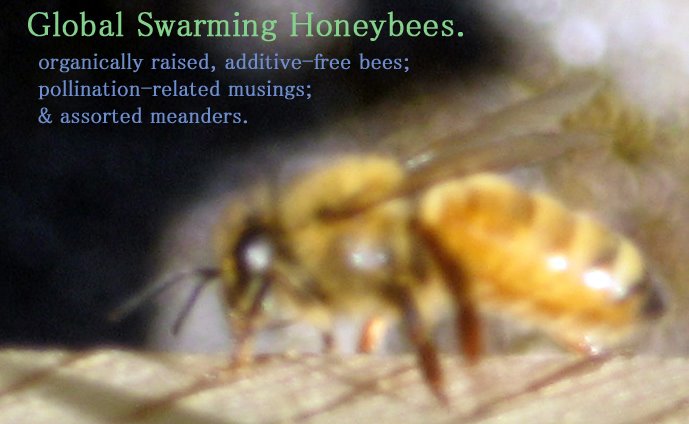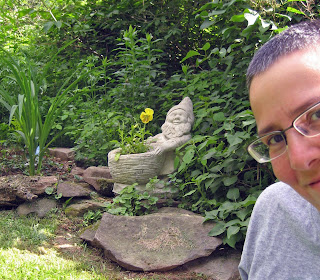
I am delighted to inaugurate the series by having you meet Gheorghe Tamas (pictured above—and below).
* * * Gheorghe and his bees on his balcony. Gheorghe collected this colony from a neighbor's chimney, where they were discovered during a renovation.
Gheorghe and his bees on his balcony. Gheorghe collected this colony from a neighbor's chimney, where they were discovered during a renovation.
* * *
Gerry Gomez Pearlberg: What is your favorite thing about keeping bees?
Gheorghe Tamas: Honey. This is why I start keeping bees. I love honey. After keeping them for few years I start to understand them and as George Imirie said I stop thinking anthropomorphic. This happened in 1997. I start reading a lot. I gave up going with the bloom and tried to use the old Latin saying: Non multa sed multum. For sure a beekeeper who pays a little attention to his bees when he opens his hive will feel some special tell to him by his bees. There are a lot to say and it's a mystery. When you fill this mystery you start to understand the bees and it's easy to work them.
Gerry Gomez Pearlberg: Do you think the taste of honey has changed for you now that you know bees so well and know how hard they work to make honey?
Gheorghe Tamas: The taste of my honey changed for me for about 4 years when I stopped using chemicals in my hives. I know that my bees are working hard for me but I try to understand them. As soon as I try to get rid of chemicals in my hives really my honey tastes different. It is difficult not to use chemicals because the honey production drops and I think that commercial beekeepers have problems but I think that more problems we have to face the CCD, Nosemoza and so on.
Gheorghe Tamas: The area where I keep my bees is a hilly area, so not many farms. It's a typical Romanian village with the church in the middle.

Gheorghe Tamas: [The] first climate changes I [noticed were] around 1995,1996. During that period I did realize myself that something happened and this bloody world take a wrong direction. They keep telling us the weather is periodically changing and a lot of nonsense. I'm a little man among the others who can understand that the weather is changing. Example: My hometown is near the river Mures, which has not frozen for about 20 years.
My opinion: we take the wrong way. I still hope it's not forever.
Gerry Gomez Pearlberg: I hope it's not forever, too, Gheorghe. Tell us a little bit about what kinds of plants your bees make honey from or forage on each year.
Gheorghe Tamas: Well, to tell you my opinion about plants for bees: the best plants for bees are weeds. They are always there and give to the bees the nectar to make honey for us. I'm sorry for them they kill them with herbicides.
Here in my area, the big nectar or honey flow I get from Acacia and from lime trees. Acacia honey flow is around 15 of May and lime honey flow is around a month later. On the hill around my apiary there is a lot of grassland from where the bees gather the very good honey named poliflore honey. It's a delicacy. As cultivated honey sources there are: sunflower, rape, etc.
Gerry Gomez Pearlberg: How did you get interested in organic beekeeping?
Gheorghe Tamas: When I read for the first time Charles Simons Charles (RIP) "Principles of Beekeeping Backwards." I wrote to him and he kindly explain to me a lot of things like "foundationless frame," "bottomless beekeeping," and so on. He explained to me a lot interesting things about the way he kept the bees and I start thinking all the way around.
Gerry Gomez Pearlberg: Is the Varroa mite a big problem there? What kinds of treatments do you use to handle Varroa and other pests of the hive?
Gheorghe Tamas: Varroa it's a problem here like in other places the man kept bees. As treatment we use Varachet. As soon as Romania became an UE member and could travel freely in all of Europe, the beekeepers started using all the drugs from Europe. I think a lot of them are not approved by Romanian authorities, who had big discussions with the beekeepers. I know because the use, for example, of Klartan (Mavrik) which is an herbicide as far as I know. They use this only because is cheaper. A lot of beekeepers have problem with Nosemoza , but till now I did not find out is it's nosemoza Apis or Ceranae.
Gerry Gomez Pearlberg: What is your favorite beekeeping story or adventure?
Gheorghe Tamas: In 1994 I was the first time going with the bloom. We were (about 6 beekeepers) with bee-wagons (see photo below) we brought to to an acacia forest 100 km far from Arad (my hometown).
Gerry Gomez Pearlberg: What advice would you give to someone who is just beginning to keep bees?
Gheorghe Tamas: My friend—love the bee, and try to understand its life. The bees will tell you how to solve management problems and help you, for sure. TRY TO UNDERSTAND THE BEE AND THE NATURE! (No, I'm not stupid—I know that science has its place in this world, but if we pass over the border it's possible to have problems. Don't you think?)
Gerry Gomez Pearlberg: Do you earn your living as a beekeeper?
Gheorghe Tamas: You can live from beekeeping, but for the moment there are not many commercial beekeepers here. From the moment we joined the EU a lot of things are changed and we have to made changes on the way, but for sure we'll do it. At the beginning I wanted to become commercial, but seeing the changes I said I have to wait. I have my job as foreman for turbines and compressors and now I work in heating system. I have kept bees from 1989 and I'm one of the thousands of Romanian beekeepers.
Gerry Gomez Pearlberg: Is there anything else you’d like to say, Gheorghe?
Gheorghe Tamas: I want to say “Thank you” to a lot of American beekeepers who kindly help me and I want to mention Michael Bush, Dee Lusby, Toni and her blog City Bees, and Gerry and her blog Global Swarming Honeybees.
I'm one among a lot of beekeepers in Romania and what I say represents only my own opinions. But please do believe me that if you do visit Romania, don't forget: THERE ARE BEEKEEPERS HERE! You'll find here nice people knowing poems about Eminescu, our national poet but also knowing about Walt Whitman’s poems. Be sure Dracula don't try to harm you—I think he will be pleased to have you here.
**
Gheorghe has asked me to be sure to emphasize that he does not speak for all Romanian beekeepers and, as he puts it, he is "a normal beekeeper like a zillion others here in Romania." He adds: "I'm lucky I know a little bit of English so I can read the information from American beekeeping [resources] and from other countries. Because of my temperament, I like to know more and more. That's all."
5.16.2008
Beek-Speak: An Interview with Gheorge Tamas
Labels:
beekeepers
Subscribe to:
Post Comments (Atom)










2 comments:
I am a beekeeper from California and I am romanian by origins and I know Gheorghe Tamas form multiple dialogs on the net regarding beekeeping. He is very knowlageable and he works hard for his bees. I have it a lot easyer here in the Bee Heaven due to great weather all year. Europe still has a long way to learn natural methods of beekeeping and improve their genetic stock but they have a lot more people intrested in bees.
Thanks for writing, Andrei.
Interviewing Gheorghe was one of the highlights of doing this blog thus far, so I am glad you enjoyed this profile.
Best wishes to you and all your bees.
Post a Comment